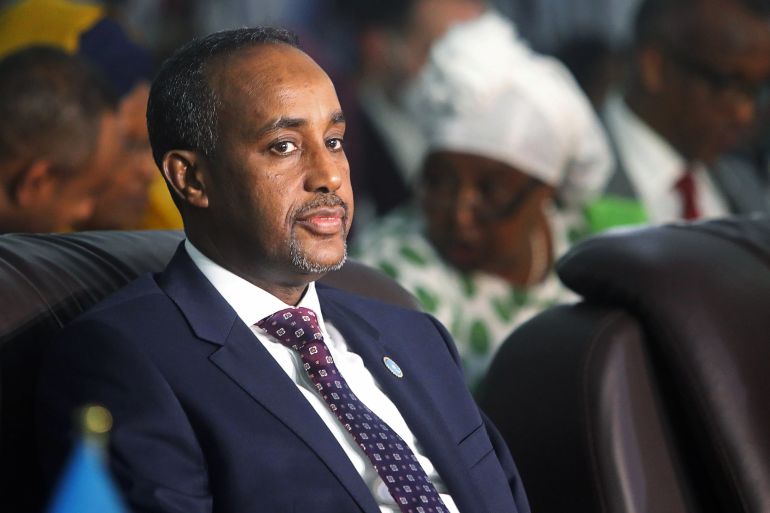Somalia swears in lawmakers as UN warns of ‘real risk of famine’
The inauguration of 290 new lawmakers brings the state a step closer to completing a prolonged electoral process.

Somalia has inaugurated 290 new lawmakers, bringing the country a step closer to completing a prolonged electoral process marred by alleged corruption and irregularities.
The ceremony was held on Thursday in the capital’s heavily fortified Halane military camp, protected by sandbagged fences and high concrete walls. Somali police and African Union troops were deployed to the surrounding areas, putting Mogadishu under lockdown.
Keep reading
list of 4 itemsApril 27, 1994: What has changed in South Africa 30 years after apartheid?
Jobless engineers, MBAs: The hidden army of Indian election ‘consultants’
Focus on southern states as India votes in second phase of mammoth election
Dozens more legislators are yet to be selected and sworn in. Later the lawmakers will elect speakers and deputies for both parliamentary chambers before they sit to choose a new president.
“We are observing a new set of parliamentarians taking over from others. I want to take this opportunity to congratulate parliamentarians who have been sworn in today. This is a huge responsibility assigned on you by your constituents, and it is a vote of confidence,” said Prime Minister Mohamed Hussein Roble.
The swearing-in took place as the UN humanitarian coordinator in Somalia warned that “the country is facing a very real risk of famine.”
Adam Abdelmoula said in a video briefing for UN reporters in New York that severe drought has compounded humanitarian needs, and 6 million people “need food assistance immediately”.
The UN asked for $1.5bn to meet humanitarian needs in Somalia in 2022, but he said that “we have received just 4.4 per cent.”
Hussein Sheikh Ali of the Mogadishu-based research group Hiraal Institute said the inauguration of lawmakers “marks a great relief day for all Somalis and (the) international community who invested in Somalia to move forward”.
In recent years, Somalia has begun to find its footing after 30 years of chaos from strongmen and the abundance of armed groups linked to al-Qaeda, al-Shabab and ISIL (ISIS).
Somalia’s parliamentary and presidential polls were delayed for more than a year amid political turmoil after President Mohamed Abdullahi Mohamed’s mandate expired in February 2021 without a successor in place. Lower house elections that were to be completed on March 15 are still not complete.
The delay led the US Department of State to announce sanctions on a number of government officials accusing them of “undermining the democratic process in Somalia”.
It also raised political tensions and the threat of violence in a country prone to attacks by fighters who oppose the federal government. In March, al-Shabab claimed to have thrown mortar shells targeting the Halane base.